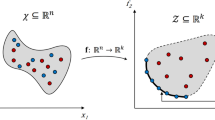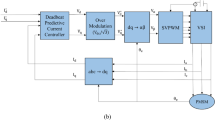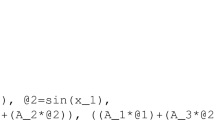Abstract
In a reconfigurable manufacturing scenario, control system design needs innovative approaches to face the rapid changes in hardware and software modules. The control system should be able to automatically tune its parameters to enhance machine performances and dynamically adapt to different control objectives (e.g., minimize control efforts or maximize tracking performances) while preserving at the same time stability and robustness properties. In this paper, a robust control system for permanent magnet synchronous motors (PMSMs), together with an online self-tuning method, is presented. In particular, a robust discrete-time variable structure control (VSC) has been designed. A heuristic bio-inspired approach has been then implemented on a digital signal processor (DSP) to find the VSC parameter set which minimizes a specific objective function each time a novel speed reference is provided. Experimental results on a PMSM motor show the effectiveness of the proposed controller and tuning method, with noticeable improvements with respect to the original manufacturer-designed controller.
Similar content being viewed by others
References
Lasi H, Fettke P, Kemper HG, Feld T, Hoffmann M (2014) Industry 4.0. Bus Inf Syst Eng 6(4):239–242
Lee J, Bagheri B, Kao HA (2015) A cyber-physical systems architecture for industry 4.0-based manufacturing systems. Manuf Lett 3(Supplement C):18–23
Fogliatto FS, da Silveira GJ, Borenstein D (2012) The mass customization decade: an updated review of the literature. Int J Prod Econ 138(1):14–25
Tieng H, Chen CF, Cheng FT, Yang HC (2017) Automatic virtual metrology and target value adjustment for mass customization. IEEE Robot Autom Lett 2(2):546–553
Mourtzis D (2016) Challenges and future perspectives for the life cycle of manufacturing networks in the mass customisation era. Logist Res 9(1):2
Mourtzis D, Doukas M, Psarommatis F (2015) A toolbox for the design, planning and operation of manufacturing networks in a mass customisation environment. J Manuf Syst 36:274–286
Koren Y (2006) General RMS characteristics. Comparison with dedicated and flexible systems. Springer, Berlin, pp 27–45
Mehrabi MG, Ulsoy AG, Koren Y (2000) Reconfigurable manufacturing systems: key to future manufacturing. J Intell Manuf 11(4):403–419
Rösiö C, Säfsten K (2013) Reconfigurable production system design—theoretical and practical challenges. J Manuf Technol Manag 24(7):998–1018
Renzi C, Leali F, Cavazzuti M, Andrisano AO (2014) A review on artificial intelligence applications to the optimal design of dedicated and reconfigurable manufacturing systems. Int J Adv Manuf Technol 72(1):403–418
Urbanic RJ, Hedrick RW (2015) A matrix-based framework for assessing machine tool reconfiguration alternatives. Int J Adv Manuf Technol 81(9):1893–1919
Rodriguez J, Kennel RM, Espinoza JR, Trincado M, Silva CA, Rojas CA (2012) High-performance control strategies for electrical drives: an experimental assessment. IEEE Trans Ind Electron 59(2):812–820
Hahn I (2012) Heuristic structural optimization of the permanent magnets used in a surface mounted permanent-magnet synchronous machine. IEEE Trans Magn 48(1):118–127
Joshi Y, Parikh K, Yadav VK (2014) Field oriented control of pmsm using improved space vector modulation technique. Int J Digit Appl Contemp Res 2(8):25–32
Adhavan B, Kuppuswamy A, Jayabaskaran G, Jagannathan V (2011) Field oriented control of permanent magnet synchronous motor (pmsm) using fuzzy logic controller. In: IEEE recent advances in intelligent computational systems (RAICS), pp 587–592
Tursini M, Parasiliti F, Zhang D (2002) Real-time gain tuning of pi controllers for high-performance pmsm drives. IEEE Trans Ind Appl 38(4):1018–1026
Li YF, Wikander J (2004) Model reference discrete-time sliding mode control of linear motor precision servo systems. Mechatronics 14(7):835–851
Li S, Zhou M, Yu X (2013) Design and implementation of terminal sliding mode control method for PMSM speed regulation system. IEEE Trans Ind Inf 9(4):1879–1891
Orlowska-Kowalska T, Tarchala G, Dybkowski M (2014) Sliding-mode direct torque control and sliding-mode observer with a magnetizing reactance estimator for the field-weakening of the induction motor drive. Math Comput Simul 98:31–45
Utkin VI (1993) Sliding mode control design principles and applications to electric drives. IEEE Trans Ind Electron 40(1):23–36
Veselic B, Perunicic-Drazenovic B, Milosavljevic C (2008) High-performance position control of induction motor using discrete-time sliding-mode control. IEEE Trans Ind Electron 55(11):3809–3817
Efe MO, Kaynak O, Wilamowski BM (2000) Stable training of computationally intelligent systems by using variable structure systems technique. IEEE Trans Ind Electron 47(2):487–496
Lin FJ, Chou WD (2003) An induction motor servo drive using sliding-mode controller with genetic algorithm. Electr Power Syst Res 64(2):93–108
Lin SC, Chen YY (1997) Design of self-learning fuzzy sliding mode controllers based on genetic algorithms. Fuzzy Sets Syst 86(2):139–153
dos Santos Coelho L, Krohling RA (2003) Discrete variable structure control design based on lamarckian evolution. In: Advances in Soft Computing. Springer, Berlin, pp 361–370
Su JP, Chen TM, Wang CC (2001) Adaptive fuzzy sliding mode control with ga-based reaching laws. Fuzzy Sets Syst 120(1):145–158
You KS, Lee MC, Yoo WS (2004) Sliding mode controller with sliding perturbation observer based on gain optimization using genetic algorithm. KSME Int J 18(4):630
Taherkhorsandi M, Castillo-Villar KK, Mahmoodabadi MJ, Janaghaei F, Mortazavi Yazdi SM (2015) Optimal sliding and decoupled sliding mode tracking control by multi-objective particle swarm optimization and genetic algorithms. Springer International Publishing, Cham, pp 43–78
dos Santos Coelho L, Ayala HVH, Coelho AAR (2015) Variable structure control optimized by differential evolution approach applied to continuous stirred tank reactor. Chem Eng Res Des 100:248–260
Storn R, Price K (1995) Differential evolution—a simple and efficient adaptive scheme for global optimization over continuous spaces. International Computer Science Institute, Berkeley
Storn R, Price K (1997) Differential evolution—a simple and efficient heuristic for global optimization over continuous spaces. J Glob Optim 11(4):341–359
Karaboga D, Gorkemli B, Ozturk C, Karaboga N (2014) A comprehensive survey: artificial bee colony (ABC) algorithm and applications. Artif Intell Rev 42(1):21–57
Krause PC, Wasynczuk O, Sudhoff SD (2002) Modern analysis of electric machinery and drive systems. Wiley, New York
Vaclavek P, Blaha P (2013) Pmsm model discretization for model predictive control algorithms. In: IEEE/SICE international symposium on system integration (SII), pp 13–18
Documentation of the MCK28335-Pro motion control kit (Accessed: 16 Jan 2018). http://www.technosoftmotion.com/de/tools/motion-control-kits/mck28335
Datasheet of the Delfino TMS320f28335 DSP motion controller (Accessed: 16 Jan 2018). http://www.ti.com/product/TMS320F28335/datasheet
Hong K, Gan WS, Chong YK, Chew K, Lee C, Koh T (2000) An integrated environment for rapid prototyping of DSP algorithms using Matlab and texas instruments’ TMS320c30. Microprocess Microsyst 24(7):349–363
Author information
Authors and Affiliations
Corresponding author
Rights and permissions
About this article
Cite this article
Ciabattoni, L., Ferracuti, F., Foresi, G. et al. A robust and self-tuning speed control for permanent magnet synchronous motors via meta-heuristic optimization. Int J Adv Manuf Technol 96, 1283–1292 (2018). https://doi.org/10.1007/s00170-018-1690-x
Received:
Accepted:
Published:
Issue Date:
DOI: https://doi.org/10.1007/s00170-018-1690-x




